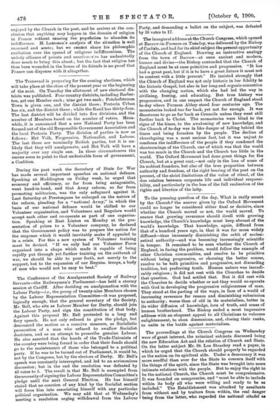Thei inaugural address at the Church Congress, which opened at
Barrow-in-Furness on Tuesday, was delivered by the Bishop of Carlisle, and had for its chief subject the present opportunity of the Church of England. Drawing an instructive analogy from the town of Barrow—at once ancient and modern, human and divine—the Bishop contended that the Church of England must be at once prilnitive and progressive. "It has had a great past, but if it is to have a great future it must not be content with a little present" He insisted strongly that the Church of England was llot only historic in her fidelity to the historic Gospel, but also ih her long and organic connetion with the changing nation, which she bad led the way in civilising, freeing, and educating. But true history was progressive, and in one respect the Church of England stood to-day where Furness Abbey stood four centuries ago. The monasteries looked too far back, yet not far enough. It was disastrous to go as far back as Councils unless they went still further back to Christ. The monasteries were blind to the signs of the times, to the awakening of new knowledge, and the Church of to-day was in like danger of falling behind the times and being forsaken by the people. The decline of churchgoing was a most serious fact, but it was unjust to condemn the indifference of the people if they condoned the shortcomings of the Church, one of which was that the world was too much in the Church and the Church too little in the world. The Oxford Movement had done great things for he Church, but at a great cost,—not only in the loss of some of its noblest founders, but also of the true proportion between authority and freedom, of the right bearing of the past on the present, of the strict limitations of the value of ritual, of the due relation between corporate life and individual responsi- bility, and particularly in the loss of the full realisation of the rights and liberties of the laity.






























































 Previous page
Previous page